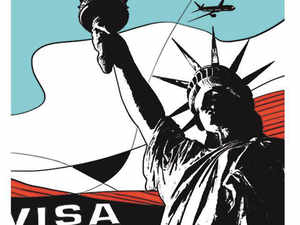
WASHINGTON: India may be looking at upwards of 500,000 of its "skilled" work force returning home from America if a proposal by the Trump administration not to extend H-1B visa of those waiting for permanent residency (Green Card) is implemented.
The Department of Homeland Security is said to be considering new regulations that would prevent H-1B visa extensions as part of President Donald Trump's "Buy American, Hire American" initiative promised during the 2016 campaign
Under current law, foreign guest workers are allowed one three-year extension of the H-1B visa of three-year validity. If at the end of those six years the guest worker has a pending Green Card (Permanent Residency) application, then there is an almost indefinite extension of the H-1B visa till such time the applicant's Green Card processing is completed.
Because there is such a huge backlog of Green Card applicants, particularly for countries such as India and China, of thousands of workers from these countries spend 10-12 years in what is mirthlessly called H-1B hell or limbo. The small 'comfort' they currently have is they can remain in the US while the Green Card is being processed.
The Trump administration is considering ending that concession. If an H-1B visa holder has applied for a Green Card at the end of his six-years then he or she will have to exit the United States till the processing is complete.
Technically, the Trump administration is correct and well within the law to amend the rules because the H-1B was meant to address skilled worker shortage in the US, and not intended to become a route for immigration.
But over the years, hundreds of thousands of skilled foreign workers, particularly Indians and Chinese have used the H-1B route to first become permanent residents (Green Card holders) and then become citizens.
They include some of the most storied names in the US tech industry, including Satya Nadella and Sundar Pichai, India-born head honchos of Microsoft and Google respectively, and because they added such immense value to the US tech industry, the whole visa category has generally been looked at favorable by both the tech industry and previous administrations.
However, in the run-up to the 2016 Presidential elections, nativist American tech workers who felt short-changed by the influx of foreign workers managed to convince the Trump campaign that there is no shortage of American tech workers and the H-1B inflow was part of the US tech industry's tactics to keep wages low.
No comments:
Post a Comment